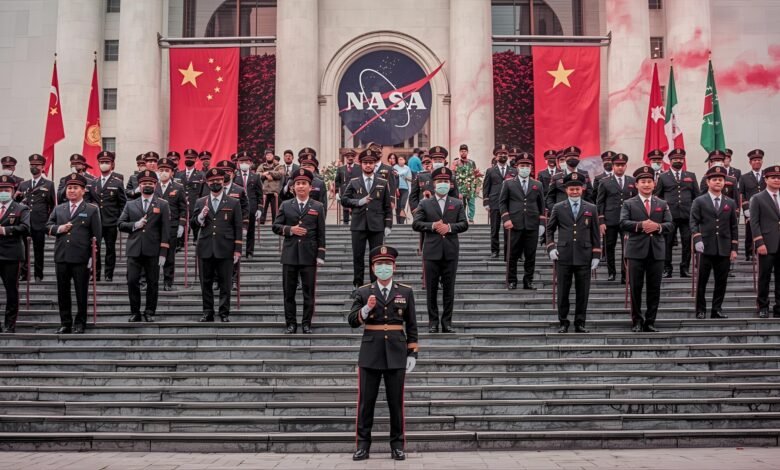
NASA bans Chinese nationals, and you’ll find a swirl of headlines, opinions, and fragments of policy. Some stories claim a blanket prohibition. Others insist the phrase “NASA bans Chinese nationals” is a misunderstanding of long-standing U.S. laws that limit certain types of cooperation rather than people. The truth is more nuanced—and more interesting—than either extreme. This article examines the origins of the notion that “NASA bans Chinese nationals,” the actual provisions of U.S. law, how NASA implements these rules in practice, and why recent reporting has reignited the debate. We’ll also explore how these policies affect research, hiring, and international collaboration in the era of Artemis and an increasingly capable China National Space Administration (CNSA).
To understand whether “NASA bans Chinese nationals” is accurate, you need to look at three layers: congressional restrictions—especially the Wolf Amendment—NASA’s foreign national access processes, and export-control laws like ITAR and the EAR. You also need to consider NASA’s baseline employment rules for civil servants, which essentially limit federal jobs to U.S. citizens. Add to that periodic controversies—like the 2013 conference incident—and more recent reports of tightened restrictions, and it’s easy to see how the phrase “NASA bans Chinese nationals” entered the public conversation.
The legal backbone: It’s about activities, not people
The Wolf Amendment in plain English
The phrase “NASA bans Chinese nationals” is most commonly traced to the Wolf Amendment, a provision first passed by Congress in 2011 and renewed annually. The Wolf Amendment prohibits NASA from using appropriated funds to engage in bilateral activities with the Chinese government or Chinese state-owned entities unless Congress and the FBI grant case-by-case approval. That’s a restriction on institution-to-institution cooperation—not a nationality test for every person who touches a NASA project. Nevertheless, when institutions implement this rule, it can influence who attends meetings, how data is shared, and which partners are eligible for funding or facility access, which is why many headlines shorthand the effect as “NASA bans Chinese nationals.”
Export controls: ITAR and EAR
Beyond the Wolf Amendment, export-control frameworks—the International Traffic in Arms Regulations (ITAR) and the Export Administration Regulations (EAR)—govern the transfer of sensitive technologies and technical data. These laws apply across the U.S. aerospace industry, not just at NASA. They can limit what controlled information is shared with non-U.S. persons (which includes non-citizens and non-permanent residents), and they impose licensing obligations for specific interactions.
Misunderstanding these rules has led some employers to over-restrict hiring in ways the Justice Department has flagged as discriminatory, showing how easily compliance can be confused with blanket bans. While export controls are real and enforceable, they do not themselves say “NASA bans Chinese nationals.” They restrict what can be shared, to whom, and under what license.
Foreign national access management (FNAM)
Within NASA, day-to-day implementation occurs through the Foreign National Access Management (FNAM) program. FNAM is a policy and process framework for vetting and approving access by foreign nationals to facilities, networks, and information. It’s where practical restrictions are applied, waivers are processed, and case-by-case decisions happen. The existence of FNAM does not, on its own, prove the claim that “NASA bans Chinese nationals,” but it explains why access can be restricted or delayed, especially when the visitor is from a country with which U.S. law requires extra scrutiny.
Why the headline keeps coming back: history and headlines
The 2013 Kepler conference controversy
In 2013, NASA’s Ames Research Center initially barred Chinese nationals from attending a Kepler Science Conference, citing legal restrictions. Scientists protested and boycotted; Representative Frank Wolf—the author of the Wolf Amendment—responded in a public letter clarifying that his amendment targets bilateral cooperation with Chinese state entities, not individual participation at a multilateral science meeting. NASA reversed its decision, acknowledging that the initial one was a mistake. That episode fueled the durable meme that “NASA bans Chinese nationals,” while simultaneously offering a documented counterexample: when misapplied, those decisions can be corrected.
Reports of tightened restrictions in 2025
More recently, multiple outlets have reported that NASA tightened restrictions on Chinese nationals’ access to facilities, networks, and programs, describing a “blanket ban” that began in early September 2025. These reports, while widely circulated, are based on journalism rather than an official NASA rulemaking posted to the agency’s newsroom, and they should be read as reporting on enforcement posture, not necessarily as a new statutory prohibition. Still, if those reports accurately reflect internal directives, it would mark a stricter implementation period—one that brings the headline “NASA bans Chinese nationals” roaring back into the spotlight.
Employment at NASA: Who can be a civil servant?
A separate but related point further complicates the “NASA bans Chinese nationals” idea. NASA is a U.S. federal agency, and—outside rare exceptions—civil service positions require U.S. citizenship. That’s not China-specific; it’s a general rule across federal hiring, with narrowly defined exceptions. NASA’s own careers pages say as much, and USAJOBS explains the limited situations in which non-citizens can be appointed. So when people hear NASA can’t hire them as a civil servant without U.S. citizenship, they sometimes misinterpret that as “NASA bans Chinese nationals,” when in fact the policy applies to all non-citizens equally.
There’s nuance here, too. A mix of civil servants and contractors carries out NASA mission work. Some contractor roles are at institutions like the Jet Propulsion Laboratory (managed by Caltech), which follow their own HR processes while still complying with NASA-imposed rules, U.S. export controls, and “designated countries” restrictions. In practice, those layers can result in certain nationalities facing additional barriers, even outside the civil service. But again, that is not the same as a statute that flatly says “NASA bans Chinese nationals.”
How the rules actually operate day to day
Funding and collaboration
The Wolf Amendment’s most direct effect is on who NASA can fund and how NASA can collaborate. Since 2011, the agency has included clauses in solicitations and grants that bar bilateral activity with Chinese government entities unless Congress approves. U.S. teams that propose China-linked bilateral work are typically ruled ineligible for NASA funding, or their proposed scope must be pared back. This has occasionally been navigated by global, multilateral data sharing, or by NASA seeking specific congressional approval for a narrow interaction when it advances safety or science. This is policy mechanics, not a nationality ban.
Access to facilities and information
FNAM requires foreign nationals to be vetted before they can access NASA centers or systems. That vetting is more stringent for some countries than others. If recent reports are accurate, individuals from the People’s Republic of China who previously had limited access through contractors or collaborations may now find that access is being curtailed pending additional reviews. In practice, this can feel like “NASA bans Chinese nationals,” especially to affected students, postdoctoral researchers, or contractors. However, the underlying authority still stems from appropriations riders, export controls, and internal security policy.
Conference attendance and scientific exchange
Multilateral conferences are a notorious gray zone. The 2013 Kepler episode showed how an overcautious interpretation can produce a de facto “ban,” even if that’s not what the law intended. Since then, NASA has had to balance openness in multilateral science with legal obligations. The agency has, on occasion, obtained approval for specific interactions—such as coordinating lunar observations during China’s Chang’e-4 mission—when science or safety is served and data are widely shared. That underscores the point: even within today’s constraints, collaboration isn’t impossible; it’s carefully fenced.
Why this matters now: the new space race context
The question of whether “NASA bans Chinese nationals” matters because the U.S. and China are pursuing overlapping lunar timelines. NASA’s Artemis program aims to return astronauts to the Moon and build sustainable infrastructure; China pursues its own crewed lunar ambitions alongside a robust robotic exploration portfolio. In that competitive context, national security concerns, espionage cases, and tech-transfer risks prompt agencies to tighten controls—and journalists to report on those shifts. The resulting perception that “NASA bans Chinese nationals” becomes both a shorthand and a flashpoint in a larger geopolitical story that affects universities, startups, and international partnerships across space science and technology.
Clarity check: Is there a blanket ban in place?
So, does NASA literally ban Chinese nationals from working on space programs? The most accurate answer is:
There is no single statute that says “NASA bans Chinese nationals,” but a combination of federal hiring rules, the Wolf Amendment’s ban on bilateral cooperation with Chinese state entities, export controls, and NASA’s access policies can significantly limit participation by Chinese nationals—especially in sensitive environments. In some periods, reported internal directives may further tighten that access, functionally resembling a ban in specific contexts.
Impacts on academia, industry, and talent
Universities and research labs
U.S. universities rely heavily on international talent, including Chinese nationals, in astronomy, planetary science, and aerospace engineering. When proposals, subawards, or facility use involve NASA funds, compliance clauses shaped by the Wolf Amendment take effect. Several analyses have noted instances of non-compliance and enforcement scrutiny, prompting institutions to tighten internal reviews. This can mean fewer bilateral projects with Chinese institutions and more caution when assigning PRC nationals to NASA-funded tasks that involve restricted data or access to facilities.
Contractors and startups
Contractors must comply with both export controls and NASA contract clauses. Firms that overinterpret export rules have found themselves in the DOJ’s crosshairs for nationality-based hiring practices that exceed what ITAR/EAR actually require, a reminder that compliance must be precise. Companies serving NASA work often adopt conservative access controls, which—in a practical sense—can sideline PRC nationals from specific roles even if the law wouldn’t compel an outright ban.
Individual career paths
For individuals, the picture depends on status and setting. Becoming a NASA civil servant generally requires U.S. citizenship, while working on NASA-related projects via contractors or universities can be possible with the proper clearances, scopes, and guardrails. In sensitive programs, Chinese nationals may face additional vetting or exclusions. Conversely, there are numerous space opportunities outside NASA—including in allied space agencies and the commercial space sector—where different rules apply.
What this means for the future of collaboration
In the near term, expect continued caution. Security concerns and geopolitics are unlikely to recede, and appropriations riders like the Wolf Amendment have been renewed year after year. At the same time, space remains inherently international. Even amid restrictions, NASA has found narrow, approved ways to coordinate when safety or scientific value demands it, such as tracking lunar spacecraft.
If great-power rivalry intensifies, the “NASA bans Chinese nationals” narrative will persist; if diplomatic channels open or Congress revises the rider, the pendulum could swing toward more scientifically driven engagement with robust safeguards. For now, precision matters: stating that “NASA bans Chinese nationals” oversimplifies a complex system of U.S. laws and agency policies that regulate activities and access, with nationality often a factor but rarely the sole determining factor.
Conclusion
“NASA bans Chinese nationals” is a powerful headline but a poor legal summary. The United States restricts NASA’s bilateral cooperation with Chinese state entities through the Wolf Amendment, polices sensitive technology through the ITAR and EAR, and manages foreign national access via the FNAM. NASA civil service jobs essentially require U.S. citizenship, which is a government-wide rule rather than a China-specific ban.
In specific periods—especially if recent reports of tightened enforcement are accurate—these measures can look and feel like a blanket prohibition for affected individuals. However, the precise reality is a web of activity-based restrictions and access controls, rather than a single statute that states, “NASA bans Chinese nationals.” Recognizing that nuance is crucial for policymakers, researchers, and students navigating a complex and rapidly evolving space ecosystem.
FAQs
Q: Is there a law that literally says “NASA bans Chinese nationals”?
No. The Wolf Amendment restricts bilateral cooperation with Chinese government entities unless specifically approved; it does not impose a universal, person-based ban. Export controls and access policies add more constraints, but together they still don’t amount to a statute that outright says “NASA bans Chinese nationals.”
Q: Why do some reports say NASA recently barred Chinese nationals?
Several outlets reported that NASA tightened access for Chinese nationals in early September 2025, describing a “blanket ban.” Those are journalistic accounts of enforcement posture, not a posted, permanent regulation. Always check whether a newsroom release exists on nasa.gov.
Q: Can a Chinese national ever work on NASA-funded research?
It depends on the role, the funding vehicle, and the data involved. NASA civil service jobs generally require U.S. citizenship; however, universities and contractors may involve non-U.S. persons in unclassified, non-export-controlled work, provided they obtain the necessary approvals. FNAM, export controls, and award clauses govern the specifics.
Q: What happened in 2013 with the Kepler conference?
Ames initially barred Chinese nationals from attending a multilateral conference. After protests and a clarifying letter from Rep. Wolf, noting that the amendment targets bilateral activities, NASA reversed its decision and allowed attendance, calling the original bar a mistake.
Q: I’m a non-U.S. citizen who wants a NASA career. What are my options?
Civil service roles at NASA typically require U.S. citizenship; however, opportunities may also be available through contractors, academia, and international partner agencies. Please note that export-controlled work and facility access may still be restricted based on your citizenship and the scope of the project.
See More: Moon in 2032 Missions, Eclipses, and New Discoveries






